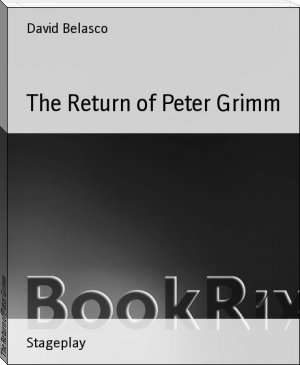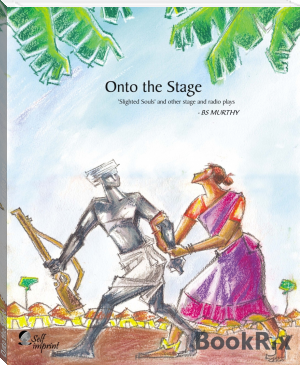The Return of Peter Grimm by David Belasco (classic reads .TXT) 📕

Read free book «The Return of Peter Grimm by David Belasco (classic reads .TXT) 📕» - read online or download for free at americanlibrarybooks.com
- Author: David Belasco
Read book online «The Return of Peter Grimm by David Belasco (classic reads .TXT) 📕». Author - David Belasco
_Peter's_ clothing was selected with unusual care so that it would not catch the reflection from the lights. Months of preparation and weeks of rehearsal were necessary.
One detail that was especially absorbing was the matter of lighting; catching the high lights and shadows. This was the first time the "bridge of lights" was used on any stage. Lighting has always been to me more than mere illumination. It is a revelation of the heart and soul of the story. It points the way. Lights should be to the play what the musical accompaniment is to the singer. A wordless story could be told by lights. Lights should be mixed as a painter mixes his colours--a bit of pink here, of blue there; a touch of red, a lavender or a deep purple, with shadows intervening to give the desired effect. Instead of throwing a mysterious light upon the figure of _Peter_, I decided to reverse the process and put no lights on him. The light was on the other people--the people still in life, with just enough amber to give them colour.
The play was cut and cut until there was not a superfluous line in it. Every word was necessary, although it might not have seemed so when read. It was only after the play was recalled as a whole, that the necessity for everything could be seen. The coming of the circus with the clown singing "Uncle Rat has come to town," and the noise of the drums, are instances of this. It seemed like halting the action to bring in a country circus procession, but its necessity is shown in the final scene when the little boy, _William_, passes away. It is always cruel to see a child die on the stage. The purpose of the coming of the circus was to provide a pleasant memory for the child to recall as his mind wandered away from earth, and to have his death a happy one. This was made more effective when Peter took up the refrain of the song as though he knew what was passing in the dying boy's mind, showing that the dead have their own world and their own understanding.
No company of players ever had situations so fraught with danger of failure. They were very nervous. Mr. Warfield appeared in the part for several weeks before he felt at ease as the living man who returns as his own spirit.
There is one memory associated with the play which will remain in my heart as long as it beats. This piece was written during the last year-and-a-half of my daughter Augusta's life. For some reason, which I could not understand then, but which was clear to me later, the subject fascinated her. She showed the greatest interest in it. The dear child was preparing to leave the world, but we did not know it. When the manuscript was finished, she kept it by her side, and, notwithstanding her illness, saw the dress rehearsal. During the writing of the play, she often said, "Yes, father, it is all true. I believe every word of it." It was as though the thought embodied in the play gave her comfort. When we discovered how ill she was, I took her to Asheville, North Carolina, thinking the climate would help her. She grew worse. Still hoping, we went to Colorado, and there I lost her.
It has seemed to me since that the inspiration compelling me to go on with "Peter Grimm," in spite of its difficulties, came from this daughter who died.
I cannot close this reminiscence of "The Return of Peter Grimm" without acknowledging the help and inspiration received from David Warfield, without whose genius and personality the play would not have been possible.
I doubt whether Mr. Belasco has ever infused so much imaginative ingenuity into the structure and picture of a play. Even in the reading, its quaint charm is instantly revealed. We quite agree with Winter in saying that the effectiveness of the role of_ PETER _lies in its simplicity. This was the triumph of Warfield's interpretation. It may have been difficult to attain the desired effects, but once reached, technical skill did the rest. It will be noted on the program that credit is given for an idea to Mr. Cecil DeMille, son of Mr. Belasco's former collaborator. "The Return of Peter Grimm" was scheduled for production in London by Sir Herbert Tree, but plans were cut short by that actor's sudden death, July 2, 1917.
Mr. Belasco's interest in the psychic and the supernatural has been seen in other plays, notably in "The Case of Becky," by Edward Locke, and in Henry Bernstein's "The Secret"--example of Belasco's most skilled adaptation from the French, though we remember the excellence of his version of Berton and Simon's "Zaza." That he thought Warfield admirably suited to this type of play was one of the chief incentives which prompted him to write "Van Der Decken" (produced on the road, December 12, 1915), a play whose theme is "The Flying Dutchman"--and not thus far given in New York.[A]
[Footnote A: Some of Mr. Belasco's recent opinions regarding the stage have been published in book form, under the title, "The Theatre through its Stage Door" (Harper).]
FORTY FOURTH STREET near BROADWAY Under the Sole Management of DAVID BELASCO
BEGINNING TUESDAY EVENING, OCTOBER 17, 1911. Matinees Thursday and Saturday.
DAVID BELASCO Presents DAVID WARFIELD -IN- THE RETURN OF PETER GRIMM
A PLAY, IN THREE ACTS.
By DAVID BELASCO.
"Only one thing really counts--only one thing--love. It is the only thing that tells in the long run; nothing else endures to the end."
CAST OF CHARACTERS.
PETER GRIMM...........................DAVID WARFIELD FREDERIK, his nephew..................JOHN SAINPOLIS JAMES HARTMAN.........................THOMAS MEIGHAN ANDREW MacPHERSON.....................JOSEPH BRENNAN REV. HENRY BATHOLOMMEY..................WILLIAM BOAG COLONEL TOM LAWTON....................JOHN F. WEBBER WILLEM..................................PERCY HELTON KATHRIEN................................JANET DUNBAR MRS. BATHOLOMMEY.........................MARIE BATES MARTA................................MARIE REICHARDT THE CLOWN.................................TONY BEVAN
PROGRAM CONTINUED ON SECOND PAGE FOLLOWING
* * * * *
PROGRAM CONTINUED.
SYNOPSIS.
The scene of the play is laid in the living room of Peter Grimm's home at Grimm Manor, a small town in New York State, founded by early settlers from Holland.
The first act takes place at eleven o'clock in the morning, on a fine spring day.
The second act passes ten days later, towards the close of a rainy afternoon.
The third act takes place at twenty minutes to twelve on the same night.
PROGRAM CONTINUED ON SECOND PAGE FOLLOWING
* * * * *
PROGRAM CONTINUED.
NOTE--Mr. Belasco does not intend to advance any theory as to the probability of the return of the main character of this play. For the many, it may be said that he could exist only in the minds of the characters grouped about him--in their subconscious memories. For _the few_, his presence will embody the theory of the survival of persistent personal energy. This character has, so far as possible, been treated to accord with either thought. The initial idea of the play was first suggested as a dramatic possibility by Mr. Cecil DeMille, to whom Mr. Belasco acknowledges his indebtedness. A conversation with Professor James, of Harvard, and the works of Professor Hyslop of the American branch of the London Society of Psychical Research have also aided Mr. Belasco.
The play produced under the personal supervision of Mr. Belasco.
Stage Director....................................William J. Dean
Stage Manager........................................William Boag
Scene by Ernest Gros.
Scenery built by Charles J. Canon
Electrical effects by Louis Hartman.]
THE RETURN OF PETER GRIMM
A PLAY IN THREE ACTS
By DAVID BELASCO
1915
[The Editor wishes to thank Mr. David Belasco for his courtesy in granting permission to include "The Return of Peter Grimm" in the present Collection. All its rights are fully secured, and proceedings will immediately be taken against any one attempting to infringe them.]
ACT I.
_The scene shows a comfortable living-room in an old house. The furniture was brought to America by _PETER GRIMM'S_ ancestors. The _GRIMMS_ were, for the most part, frugal people, but two or three fine paintings have been inherited by _PETER_.
_A small, old-fashioned piano stands near the open window, a few comfortable chairs, a desk with a hanging lamp above it, and an arm-chair in front of it, a quaint old fireplace, a Dutch wall clock with weights, a sofa, a hat-rack, and mahogany flower-pot holders, are set about the room; but the most treasured possession is a large family Bible lying on a table. A door leads to a small office occupied by _PETER'S_ secretary._
_Stairs lead to the sleeping-rooms above. Through the window, hothouses, beds of tulips, and other flowers, shrubs and trees are seen. "Peter Grimm's Botanic Gardens" supply seeds, plants, shrubbery and trees to the wholesale, as well as retail trade, and the view suggests the importance of the industry. An old Dutch windmill, erected by a Colonial ancestor, gives a quaint touch, to the picture. Although _PETER GRIMM_ is a very wealthy man, he lives as simply as his ancestors._
_As the curtain is raised, the room is empty; but _CATHERINE_ is heard singing in the dining-room. _JAMES HARTMAN, PETER'S_ secretary, opens his door to listen, a small bundle of letters in his hand. He is a well set up young man, rather blunt in his manner, and a trifle careless in his dress. After a pause, he goes back into the office, leaving the door ajar. Presently _CATHERINE_ enters. In spite of her youth and girlish appearance, she is a good, thrifty housekeeper. She wears a simple summer gown, and carries a bunch of gay tulips and an old silver pitcher, from which she presently pours water into the Harlequin Delft vase on _PETER GRIMM'S_ desk. She peeps into the office, retreating, with a smile on her lips, as _JAMES_ appears._
CATHERINE. Did I disturb you, James?
JAMES. [_On the threshold._] No indeed.
CATHERINE. Do you like your new work?
JAMES. Anything to get back to the gardens, Catherine. I've always done outside work and I prefer it; but I would shovel dirt rather than work for any one else.
CATHERINE. [_Amused._] James!
JAMES. It's true. When the train reached the Junction, and a boy presented the passengers with the usual flower and the "compliments of Peter Grimm"--it took me back to the time when that was my job; and when I saw the old sign, "Grimm's Botanic Gardens and Nurseries"--I wanted to jump off the train and run through the grounds. It seemed as though every tulip called "hello" to me.
CATHERINE. Too bad you left college! You had only one more year.
JAMES. Poor father! He's very much disappointed. Father has worked in the dirt in overalls--a gardener--all his life; and, of course,





Comments (0)